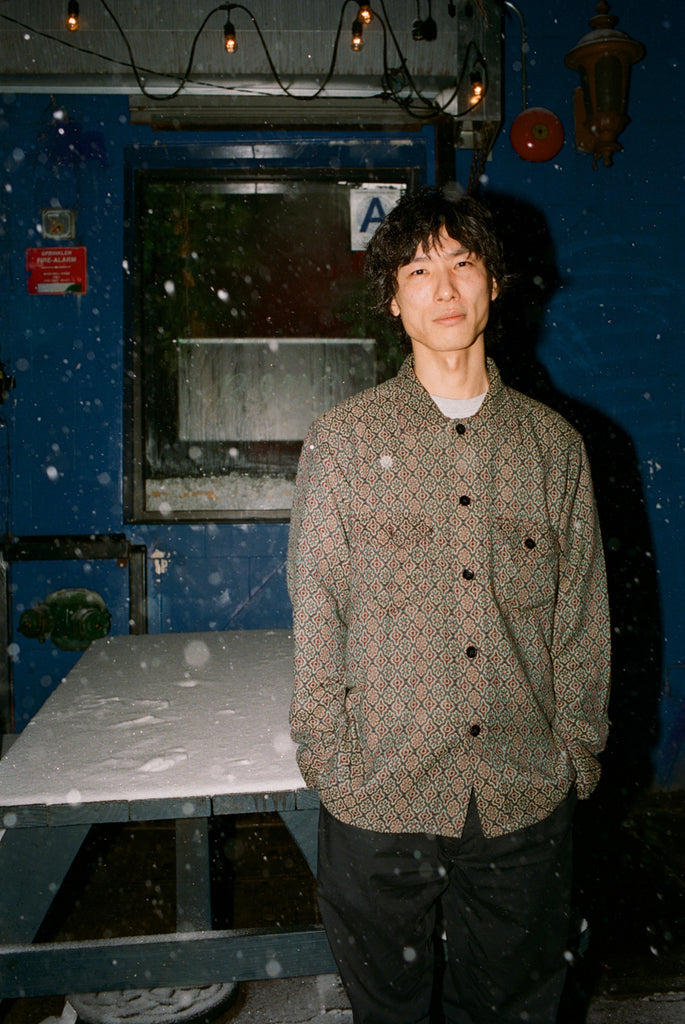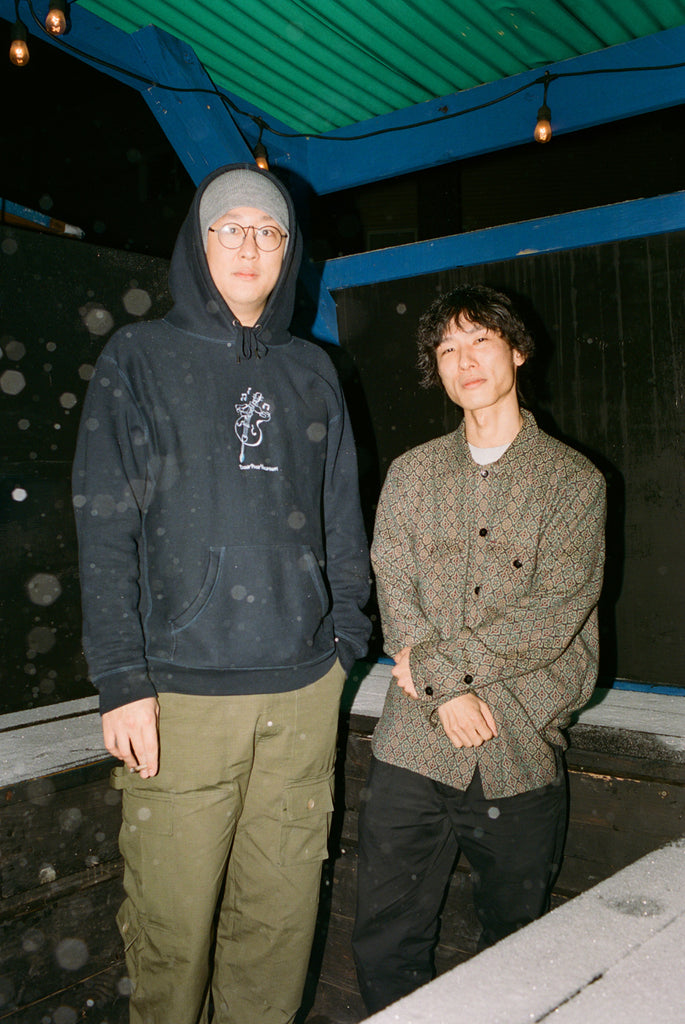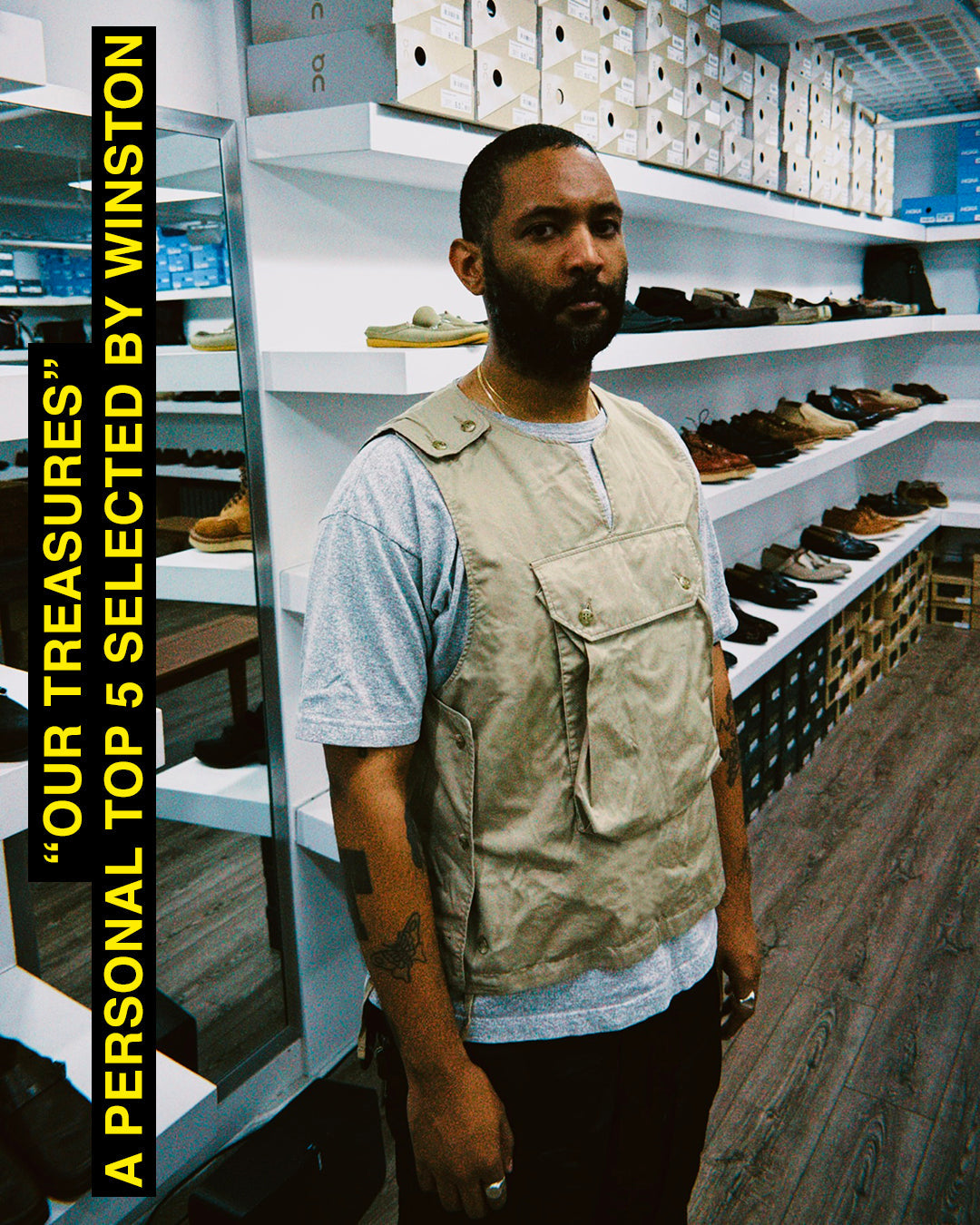[NEPENTHES PEOPLE] MASAHIRO UEDA
Welcome to the fourth chapter of NEPENTHES PEOPLE. In this series we reach out to the customers who embody the essence of our store - in other words, our “NEPENTHES PEOPLE”. Across age, profession, and background these special New Yorkers each tell a piece of the Nepenthes story.

Take a walk in Brooklyn’s Bushwick neighborhood late on a Friday night, and you may hear the rumblings of electronic music leaking out from a club, warehouse, or converted apartment. The Brooklyn music scene is an active feature of New York City’s landscape, pioneering soundscapes and facilitating parties for anyone game enough to enter a dark room packed with sonic acolytes.
Music and fashion are intertwined, with one affecting the other in a cycle of continuous adaptation. Just as Nepenthes constantly pushes boundaries in the sphere of clothing, the myriad DJs and musicians in Brooklyn unceasingly pioneer new forms of sonic expression. The same passionate link exists between the individual and music as with fashion, and it is natural that the two should blend. We strive to cultivate connectivity within New York City through this series, further enriching the lives of our customers and in the hope of a deeper understanding of culture.

Masahiro Ueda - or “DJ Healthy” as he goes by on stage - is an active participant in the New York music arena, helming his own record label, organizing parties, tour managing and of course mixing sets. We caught up with him at his “Doghausu” part, an event he organizes at Brooklyn’s Mood Ring with Phillip Chung, who performs under the alias “Chung”. Founded as a space where everyone can get together and hang out as a family, the event’s title is a portmanteau, mixing “dog” - a crucial member of the household - and house music, the primary genre of music played. This party focuses on inclusivity and open-mindedness, booking up-and-coming Brooklyn acts, weaving in gender balance and providing a platform for POC amongst the performing DJ’s and creating a space where everyone can be free and dance.

For Masa (as his friends call him), music began an escape from the rigid all-boys school he attended in Kanagawa. Renting a copy of “The Matrix: Music from the Motion Picture” at his local Tsutaya CD rental store, he was exhilarated by the frantic, anti-establishment sounds, and was thrilled by having an interest all his own. He moved quickly into trance music, devouring records by System F and Armin Van Buuren, and collecting compilation mix CDs like Mega Trance and Trance Rave.

A sense of openness and connectedness through music has remained a constant in Masa’s work. His first serious step into a music community occurred when he was in high school, as he sought acceptance. Not concerned with the rules of society, his older friends formed a bond through music and took him from small parties to large events at Makuhari Messe and rave festivals held in the countryside of Japan. The brotherhood and emotion during this time forged an indelible bond between Masa and music and awakened a desire to one day host events of his own.

Upon entering university, his interest shifted more to house music. The trance parties he once frequented became faded, plagued by outbreaks of violence and mounting issues. Though he pursued a marketing degree, he faced a crossroads at graduation. Japan’s unwritten, but widely heeded social rules demand participation in the shukatsu job hunting tradition, where students race to secure a job offer in order to start working just days after their graduation. Masa leapt into the breach, forgoing this process to pursue a career in the music industry full-time.

After graduation, Masa transformed from spectator to participant, starting from the bottom rung with a job as a floor staff at Shibuya’s night club WOMB. In his spare time, he dug for records at Disk Union and Technique or honed his DJ skills on Technics equipment. He started organizing parties at hole-in-the-wall venues across Tokyo, learning more about booking DJ’s, curating acts, and attracting a crowd.
Even while living in Japan, Masa viewed New York City as the mecca for house music - home to the hallowed Dope Jams record shop, The Bunker party, L.I.E.S. records and countless legendary house acts. Eager to make his own mark on the city, he moved to New York in 2013, and discovered a new world.

Arrived in a hostel off the Morgan L Train stop in Brooklyn, he steeped himself in New York’s music scene, overcoming struggles to organize his own parties and connecting with artists like Terekke, Bookworms, Beta Librae, DJ Wey (now more known as DJ Python), Aurora Halal, Huerco S., and Anthony Naples through Bossa Nova Civic Club in Bushwick. John Barclay’s Bossa Nova Civic Club became a sanctuary for Masa, where he participated in organizing parties. The club was a cross point for upcoming new generation DJs in New York to come together and create a new sound, new scene in Bushwick. He was struck by the level of creativity in Brooklyn as contributions from musicians like Galcher Lusterwerk’s infamous 2013 “Blowing Up The Workshop” pushed the boundaries of house music forward. At the same time, the reality of living in a foreign country made him consider his own roots. Facing discrimination as an Asian person in America, he became more aware of his identity as a Japanese person.

Moving back to Japan from 2016 to 2018, he felt out of place once again, experiencing a reverse culture shock both in music and culture. Here he developed the groundwork for events that could connect the United States and Japan (He started booking artists from NY like Aurora Halal), encouraging mutual understanding and pushing the musical envelope. In service to this notion, he started organizing experimental events at Tokyo’s SuperDeluxe, booking acts like Yoshio Ojima & Satsuki Shibano, Huerco S., Ultrafog, Phew, Yasuaki Shimizu, Carl Stone, Foodman and Hair Stylistics and more.

Masa returned to New York in 2018. These days he works a day job at Palace Skateboards while focusing on his music work. He continues to bring passion and generate support to bridge the gap between his two homes, organizing events like Aurora Halal’s “S-R Meets Tokyo” in 2020 at Contact Tokyo, an offshoot of New York’s famed “Sustain Release” music festival (Resident Advisors number one ranking festival for four straight years), featuring a lineup of the best new generation DJs from both New York and Japan. His nascent record label, Will Records, is gearing up for its first release later this year, a collaboration between Hair Stylistics and Foodman.
Looking ahead, Masa is seeking the right timing to hold another event in Japan, incorporating both overseas and domestic performers. Though travel restrictions make planning anything difficult, keep an eye out for Masa’s next party in Japan before the end of the year.

Masa’s link between America and Japan makes him a natural fit at Nepenthes. Music and fashion share more than a simply abstract connection. Although DJs tend to place more emphasis on the music they play than the clothes they wear, physical appearance is nonetheless a factor in an artist’s identity. While he does not consider himself a “fashion person”, Masa was attracted to the workwear elements of Engineered Garments, first shopping at the store in 2014. As Masa describes it, DJing shows can be sweaty/a messy affair - on the alert for spilled drinks and wayward cigarette butts. Nonetheless, occasionally donning these threads for his shows, and building his collection of Needles and South2 West8 items, in addition to his Engineered Garments pieces.

If you’re interested in seeing Masa live, you can attend the next “Doghaus” event at Mood Ring on March 25th and April 30th or catch him at Public Records on April 23rd as he kicks off his show. Check out below for links to his Instagram and Soundcloud accounts.

![[FABRIC INSIGHT] Multi Color Polyester Floral Camo](http://nepenthesny.com/cdn/shop/articles/MT_NY_1.jpg?v=1647540191)

![[DEEP DIVE] A-1 JACKET](http://nepenthesny.com/cdn/shop/articles/DD-A1-1T.jpg?v=1648593794)